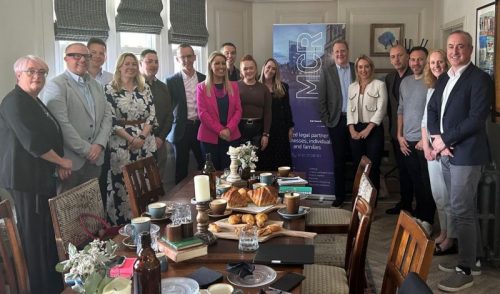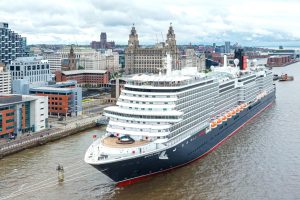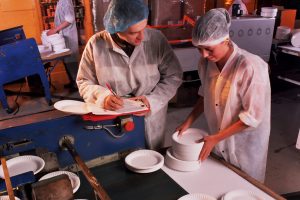Manchester, a global city with a village feel

An impressive group of representatives from across Greater Manchester’s professional services sector came together at the Black Friar in Salford to discuss the growth and future of the city region.
The discussion started with Mark Traynor and Rick Life from law firm Harrison Drury outlining their goals for the new Manchester office.
This highlighted their aims to attract and retain top talent locally through opportunities the city offers.
Mark Lyons of Puma Investments explained how went about convincing the London firm to open in Manchester, saying: “I approached Puma, which was very London centric, they would send somebody up to a regional location, once a quarter, they’d go around the town, they’d say, Hello, and then they get the train back to London and and everyone forgets about them and they’d wonder why they weren’t getting good deal flow from the North.”
He emphasised the importance of maintaining local relationships is absolutely key.
Sarah Balsom of Interpath Advisory, who has worked in Leeds too, said: “Manchester feels like an oversized village, but it’s got an International Airport, two major football clubs, universities, so it pulls all of those businesses towards it, because you’ve got the talent, you’ve got the wealth, you’ve got the investment, which then brings all of our advisory offerings to the city as well.”
Nikki Freeman from Knight Corporate Finance, a real tech specialist, explained how the firm is looking at moving from Warrington to have a permanent Manchester presence, mostly for the purposes of retaining and nurturing talent.
Tom O’Dell from Praetura drew a distinction with London, where ecosystems may grow around a sector: “I think in this region, people are connected enough at the moment so we can stand to maintain a constant connectivity and collaborative approach.”
Deborah Walker from MIDAS provided statistics on Manchester emerging as a true global city. She cited sporting heritage and technology driving the profile, while Janine Smith of the Greater Manchester Business Growth Hub emphasised the collaborative network, like none other in the UK, saying “it comes back to just how everybody was worked.”
Sam Booth from Pro Manchester echoed this, likening Manchester’s business community to a “big village” where connections form easily. She said: “I always liken Manchester to a big village. And so you know, it’s got this global impact. But actually, you can get across it quite quickly. You can build a network really, really quickly, and you can really build those relationships.”
Peter Holt from Rowan highlighted the health of the professional services community was linked to the growing number of wealthy local entrepreneurs reinvesting in the area.
Ruby Melling emphasised how Manchester people support each other and provide platforms for young people like her to grow a good businesses. She said: “I find Manchester is such a special place to support each other, and really platform good businesses. I don’t know, anywhere else like it and probably comes back to the DNA of the place.”
Jane Booth from private bank UBS agreed, and said: “We’re ultimately supporting businesses and entrepreneurs. So you have to support the entrepreneurial ecosystem to have the professional services ecosystem.
“I speak to other leaders in other international cities and the key difference where we really stand out is that we understand that any relationship with an entrepreneur with a business is the relationship, it’s not a transaction.”
Other topics included Manchester’s growth attracting various industries, its unique collaborative culture powering success, challenges around skills gaps, and the future of work with AI advances.
Rick Life discussed establishing Harrison Drury Manchester almost as a start-up within an established regional firm, praising opportunities to mentor junior colleagues locally.
It wasn’t all back slapping though, Richard Morley from RBC Brewin Dolphin warned of the risks within our control, all the things that attract people to Manchester, universities, the second largest Chinese community outside of London, a huge amount of wealth, and international influence coming into the city. ”What’s in our power is to drive business within the community in the way that we’ve always had. If that maintains then I can’t see any issues, but it’s the external factors that we have no control over that I worry about.”
Rob Richardson from MHA issued a note of caution on the importance of building the transport infrastructure in line with the growth of the city to make sure it remained accessible.
The roundtable provided insightful perspectives from driving Manchester’s success through collaboration and supporting an inclusive, entrepreneurial culture.
Other key comments shared at the round table
Mark Traynor: “We know Manchester, but the firm had never stepped into that sort of arena before and so it has opened up those new markets. It’s a great city, there’s lots of opportunities from a legal angle, but also it was about talent, attraction and retention as well, which are very critical for the firm.”
Deborah Walker: “And actually, what we’re now seeing is our sporting heritage, which has driven a lot of that, you know, fun place to be community and social aspects of the city is now matching our aspirations of being a really strong competing city in areas like financial professional services, but really in most supporting technologies in areas like cyber, AI and in other aspects of digital and technology. We really are very firmly saying we’re a go to location within the UK.”
Andrew Taylor, Freshfield: “Manchester is a global city, but within certain sectors like professional services and property, it can also be a village where people want to do business with the consultants and advisors that are here. For us, having that presence on the ground here and spending time with people is vital. I agree with that sentiment that the professional community in Manchester is a very supportive one where the competition is healthy and where people help each other.
“I don’t think Manchester is the kind of city that will become complacent. It’s always been innovative and resilient. The world is changing rapidly but I see Manchester playing a lead role in that change, rather than scrambling to adapt to it.”








